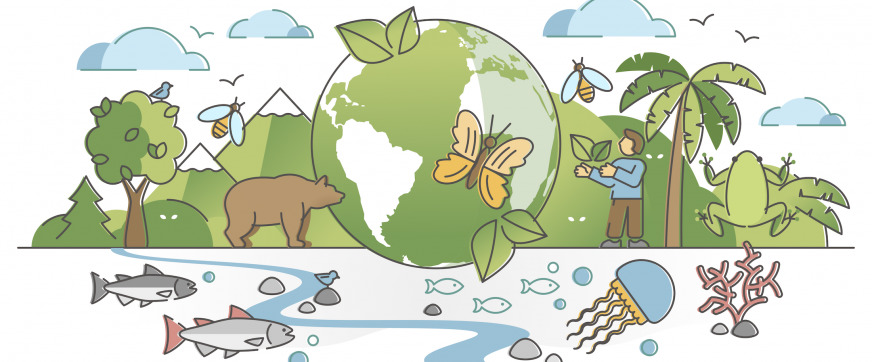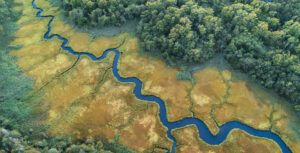- SIWI – Leading expert in water governance
- /
- Latest
- /
- Celebrate Biodiversity Day by remembering water
Celebrate Biodiversity Day by remembering water
Across the world, the Covid-19 pandemic has made more people aware of the growing threats to ecosystem services that we have until now taken for granted, including food and freshwater.

A fifth of countries worldwide are at risk of ecosystem collapse, according to an assessment from a Swiss insurance company and other studies point in the same direction. The Intergovernmental Science-Policy Platform on Biodiversity and Ecosystem Services (IPBES) warns of an era of mass extinction of species that could threaten also human existence.
Yet, the Secretariat of the Convention on Biological Diversity has picked the slogan “We’re part of the solution” for this year’s Biodiversity Day to highlight all the important work that is going on across the world to support ecosystems and strengthen the natural world. This is supported by reports from both IPCC (the Intergovernmental Panel on Climate Change) and IPBES which emphasize the need for many and powerful measures to limit climate change and stop the loss of biological diversity -and also to deal with the unavoidable consequences.
2021 is a crucial year for nature
Climate change and loss of biological diversity are two parallel crises, clearly interlinked. This needs to be acknowledged in the negotiation conferences for both the biodiversity and climate conventions taking place in 2021. The negative effects on biological diversity due to land use changes, pollution of surface and ground water and over extraction of water is multiplied by climate change. Measures to support and improve biodiversity need to consider these multiple causes.
There is however intense activity on the ground, with many new initiatives to protect biodiversity through improved practices in farming, agriculture, and landscape management. Many of these approaches have turned out to successfully address several problems at once. Reforestation of forests and natural grasslands along rivers can for example simultaneously improve water quality, decrease soil erosion, and store carbon. Similarly, agroforestry is good not only for climate mitigation but also to improve soil moisture, soil quality and food security while contributing to water recharge.
SIWI works actively to provide platforms for knowledge exchange and raise awareness of these types of solutions that can help us tackle biodiversity loss as well as the climate crisis and the 17 Sustainable Development Goals. One way to learn more about this is to follow the many webinars of the SIWI Swedish Water House team (some in English and some in Swedish). The most recent webinar was organized together with SLU and WWF and looked specifically at the water-related solutions to strengthen biodiversity. Key messages from this webinar were:
- that restoration of biodiversity is slow process, improved biodiversity can take many years after measures are taking. Ensuring baseline studies (before the measure), and monitoring of progress several years after the measures, are needed to be able to evaluate the effect.
- taking a landscape perspective for land- and water use was recommended to identify and handle trade-offs and synergies between user needs and measures taken.
- exchange of knowledge, nature-based solutions and collaborative action is highly recommended.
Here are some other important lessons:
- All ecosystems become under stress because of the way we have broken the water cycle. Many rivers no longer flow naturally because of dams and diversions; groundwater is overpumped and increasingly polluted. This poses clear risks not only specifically to freshwater ecosystems – where the populations of fish and frogs have fallen by more than 80 per cent over the past 50 years – but to all To improve biodiversity, we must protect the flow of water through the landscape.
- Water must always be part of both urban and rural planning. Unfortunately, the role of water is often forgotten. Many decision-makers do not understand how cities depend on surrounding forests and landscapes for freshwater and protection against flooding.
- Forestry must protect watersheds. SIWI helps build capacity among practitioners to increase biodiversity, reduce pollution, and facilitate groundwater recharge.
- Good landscape management is key to waterflow, biodiversity and climate mitigation and adaptation. There is a growing understanding of the role of productive landscapes for the climate, as described in the 2019 IPCC report Climate Change and Land, with our SIWI colleague Professor Anna Tengberg as one of the contributing authors.
- Protecting oceans starts on land. Our oceans are estimated to account for 80 per cent of the planet’s biodiversity. To protect them, SIWI is spearheading the source-to-sea approach, which is now gaining traction. It is finally understood that ocean health largely depends on what happens on land.
All life depends on water, which we must always keep in mind to protect our ecosystems and life on Earth as we know it.
Most recent

SIWI’s endorsement of the COP29 Declaration on Water for Climate Action
- Water and climate
- World Water Week
- Water governance

Women hold the key to building climate resilience
- Gender and water
- Resilience through water

World Water Week and SIWI in 2025
- World Water Week
- Resilience through water

SIWI-WASH experts join IVL




